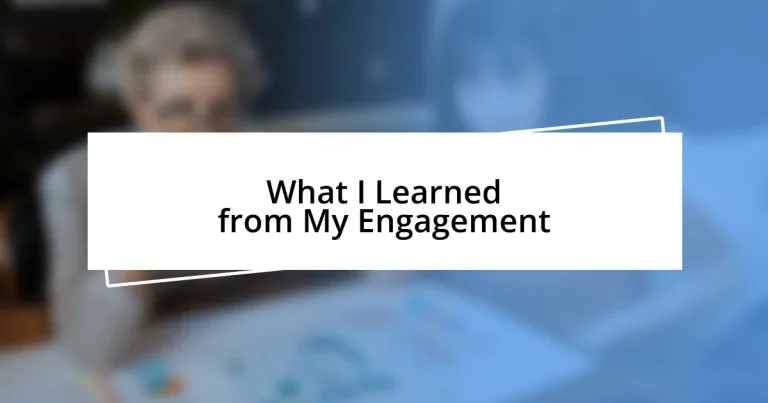Key takeaways:
- Communication is essential; open and honest dialogue strengthens relationships.
- Balancing individuality with togetherness is crucial for personal growth and partnership.
- Compromise fosters mutual respect and transforms conflicts into opportunities for intimacy.
- Involving family and friends while maintaining relationship boundaries enhances connection.
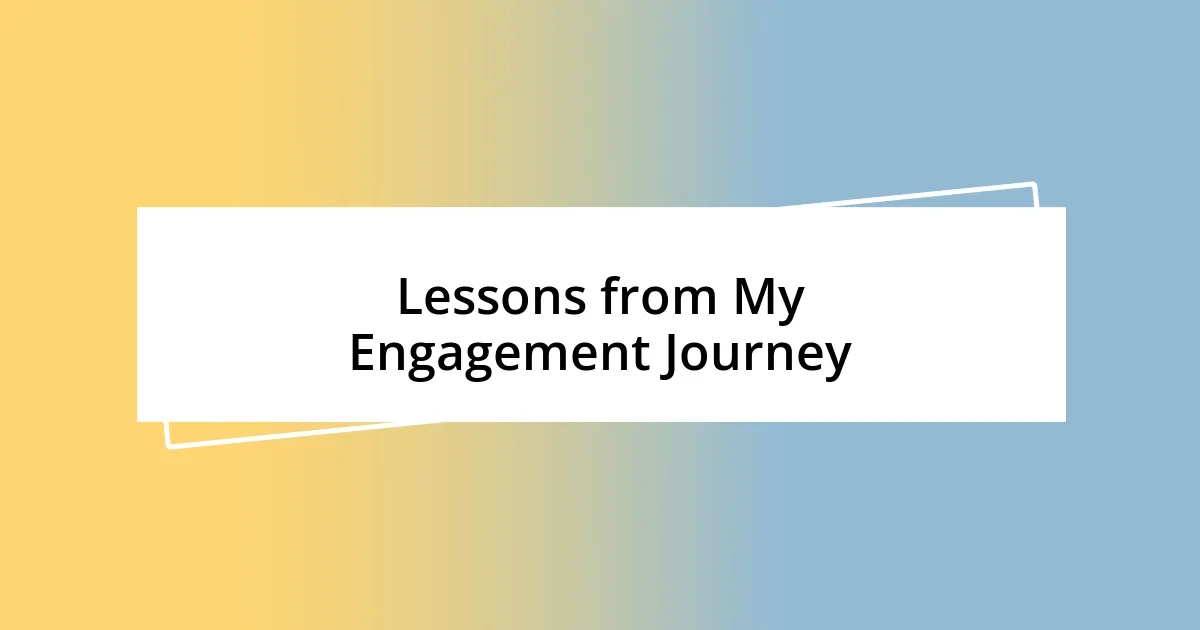
Lessons from My Engagement Journey
One lesson that really stood out during my engagement journey was the importance of communication. I remember late-night discussions filled with laughter and sometimes tears as we navigated our dreams and fears about the future together. Have you ever found yourself in a moment where a simple conversation transformed your relationship? I certainly have, and it taught me that being open and honest can create an unbreakable bond.
Another key takeaway for me was the significance of balancing individuality with togetherness. While planning the wedding, I found myself losing sight of my own interests and passions. It made me realize that maintaining my identity not only enriches me but also enhances our partnership. I often wonder, how can we thrive as individuals while still being a unit? Striking that balance has been a journey, but one I’m committed to continuously exploring.
Lastly, my engagement taught me about the beauty of compromise. I recall a particularly heated debate over wedding colors—who knew that could stir such strong feelings? Navigating those differences helped me appreciate the value of meeting halfway. It encouraged me to embrace flexibility, turning challenges into opportunities for growth. Isn’t it fascinating how these small moments can strengthen a relationship in the long run?
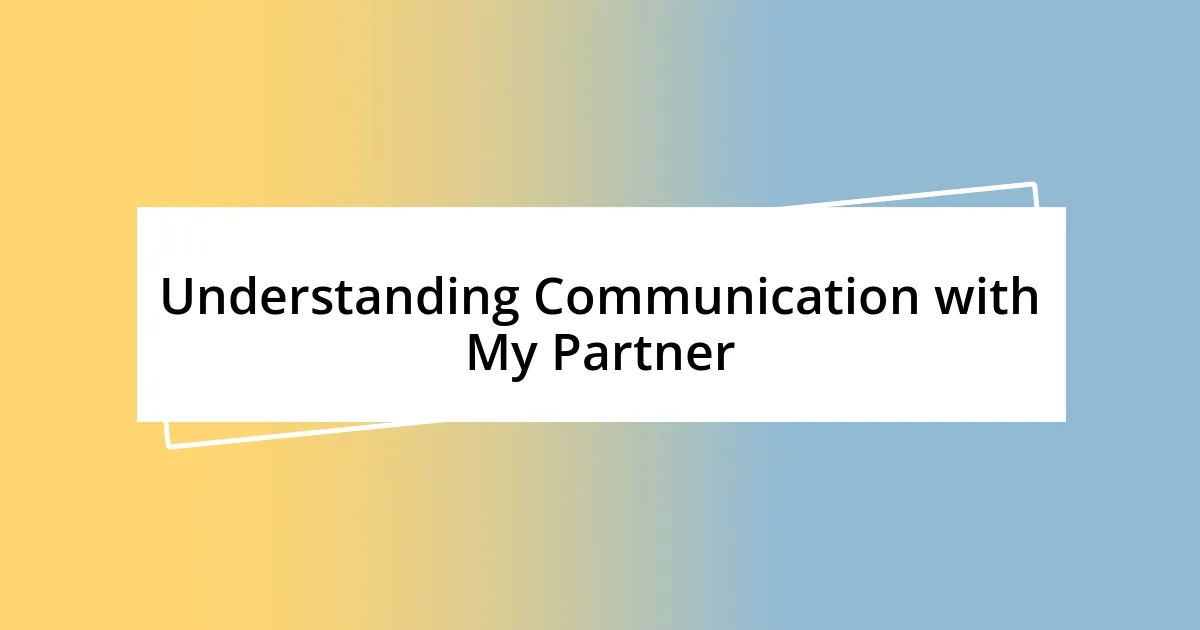
Understanding Communication with My Partner
Understanding my partner’s communication style has been a game-changer for us. I remember a moment we had a miscommunication over dinner plans. I was excited about trying a new restaurant, but my partner thought I was suggesting our usual spot. This seemingly trivial misunderstanding led to a deeper conversation about how we express our preferences. From that experience, I realized that actively listening and asking clarifying questions can prevent unnecessary tension.
Over time, I discovered that we both communicate differently when we’re stressed. I tend to retreat and process my thoughts alone, while my partner is more vocal about their feelings. One evening, after a long day, I felt an urge to shut down, but instead, I chose to share my feelings. This simple act brought us closer and underscored the importance of understanding each other’s approaches. How often do we pause to recognize our partner’s needs during tough times? Embracing this knowledge has made our relationship stronger.
Reflecting on our growth, I’ve found that the key is to create a safe space for honest dialogue. We often dedicate time to check in with each other, setting aside distractions to talk about our days, hopes, and concerns. It’s incredible how these moments foster a sense of connection. Have you ever sat down with your partner just to share? I invite you to try it—you might uncover layers of your relationship you never knew existed.
| My Communication Style | My Partner’s Communication Style |
|---|---|
| Prefers retreat during stress | Prefers vocal expression |
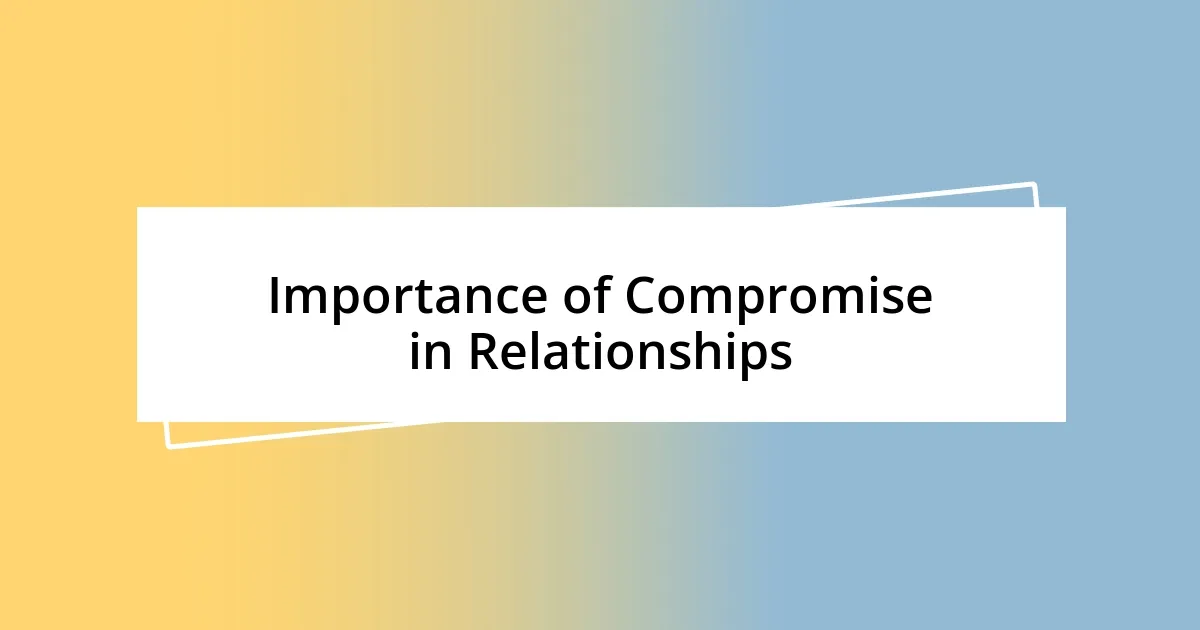
Importance of Compromise in Relationships
Compromise has been a cornerstone of my engagement experience, teaching me that it’s not always about winning. I recall sitting down with my partner after a long day, each of us clutching our opinions on the honeymoon destination. I suggested the beach, while my partner dreamed of a mountain retreat. Instead of insisting on my choice, I listened—and you know what? We ended up finding a destination that combined both! Discovering that middle ground not only brightened our plans but also deepened our connection. It reminded me that relationships thrive when we embrace each other’s desires and work together.
- Compromise fosters mutual respect and understanding.
- It helps prevent resentment by allowing both partners to feel heard.
- Finding common ground can create unexpected joys and shared experiences.
In moments of disagreement, I’ve realized compromise can transform potential conflicts into opportunities for intimacy. I vividly remember grappling over our guest list—my family is large, while my partner’s is more intimate. Instead of sticking rigidly to my preference, we sat down with a spreadsheet, laughing as we navigated through names. That lighthearted approach turned a frustrating topic into a fun collaboration. Such experiences reaffirm that when we compromise, we affirm our commitment to the relationship, and that, in itself, is a profound reinforcement of our bond.
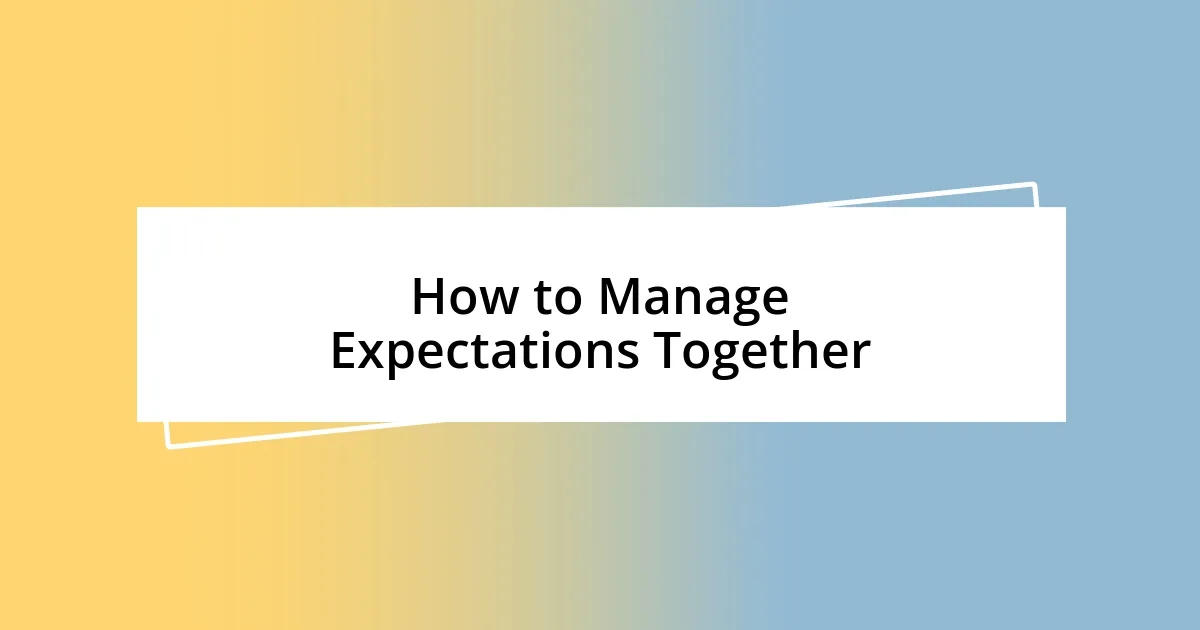
How to Manage Expectations Together
Managing expectations together is crucial in any relationship, and I’ve learned that transparency is key. Early in my engagement, I expected that every weekend would be spent together, filled with grand dates. However, my partner needed downtime after a hectic week. It was eye-opening to realize that my expectations weren’t necessarily aligned with their needs. By openly discussing what we both wanted from our downtime, we found a balance that worked for us, reminding me that assumptions can easily lead to disappointment.
Another vital aspect has been setting realistic timelines. I remember when we were planning our wedding. I had visions of an elaborate event, while my partner preferred something simpler. At one point, I felt overwhelmed with the logistics and put pressure on us to make swift decisions. That’s when I learned to breathe and slow down. By collaborating and discussing our priorities together, we could create a plan that felt right for both of us. Have you ever felt the weight of expectations in your relationship? Addressing them together transformed our planning process into a joyful journey rather than a stressful ordeal.
Ultimately, I find that regular check-ins can be incredibly beneficial. We make it a point to ask, “How are we feeling about our plans?” or “Is there anything we need to address?” During one of these conversations, my partner revealed a lingering worry about balancing time with family and friends amid wedding prep. By tackling this concern together, we adjusted our approach and ultimately enhanced our connection. It’s fascinating how just a few open conversations can lead to a clearer understanding of each other’s expectations, don’t you think?
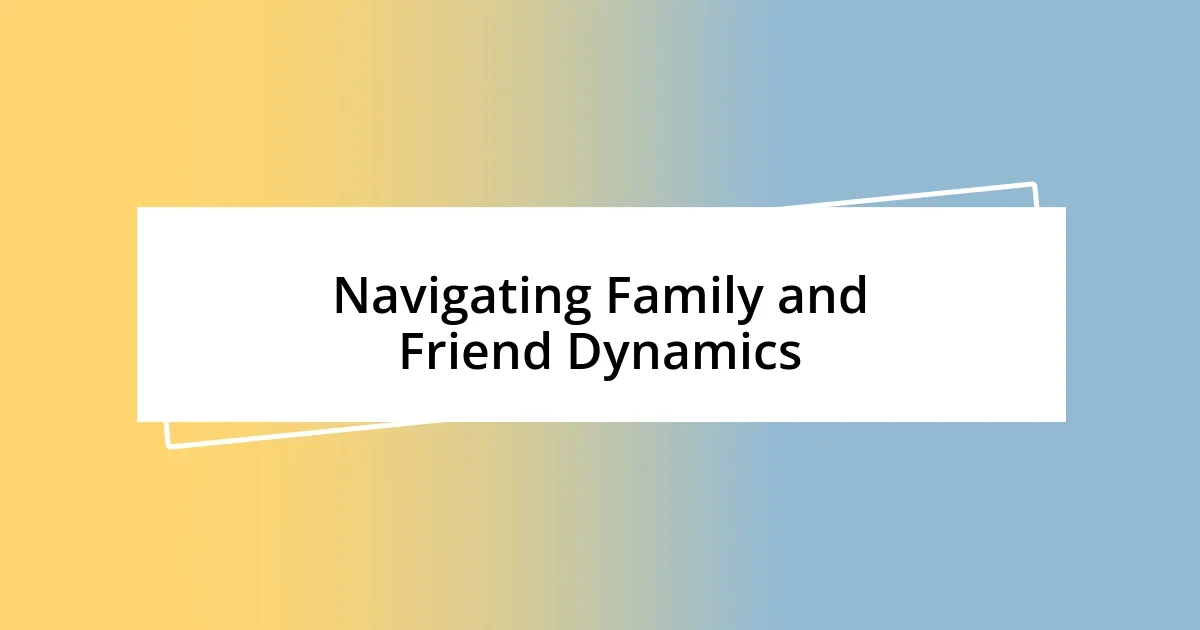
Navigating Family and Friend Dynamics
Navigating family and friend dynamics during my engagement was a journey of its own. I’ll always remember the day we first introduced our families. The atmosphere was charged with excitement, but also a hint of tension. My heart raced as I worried about whether they’d mesh. To my surprise, they found common ground with shared laughter and stories, easing what could have been an awkward situation. Have you ever felt that mix of anticipation and dread when introducing loved ones? It taught me that creating an open and warm environment can pave the way for familial bonds.
One of the most unexpected challenges was balancing differing opinions from friends regarding wedding plans. I recall a close friend voicing her strong preference for a particular venue, while I was drawn to something entirely different. At first, I felt torn between her enthusiasm and my vision. But I took a step back and asked myself: whose opinion truly mattered at that moment? It was a moment of clarity—I learned to prioritize my feelings and share them openly. By doing so, I strengthened my friendship, showing that honesty fosters deeper connections.
As we navigated this path, I found myself constantly reassessing my roles within these dynamics. One evening, I sat with my partner, reflecting on how to involve our loved ones without compromising our vision. It was eye-opening to realize the importance of boundaries. I learned that while it’s valuable to include family and friends, protecting our bond and mutual desires must come first. It made me wonder, how do you ensure that your relationship remains at the forefront while managing external expectations? This experience not only solidified our partnership but also taught me that balancing influences requires ongoing communication and respect.
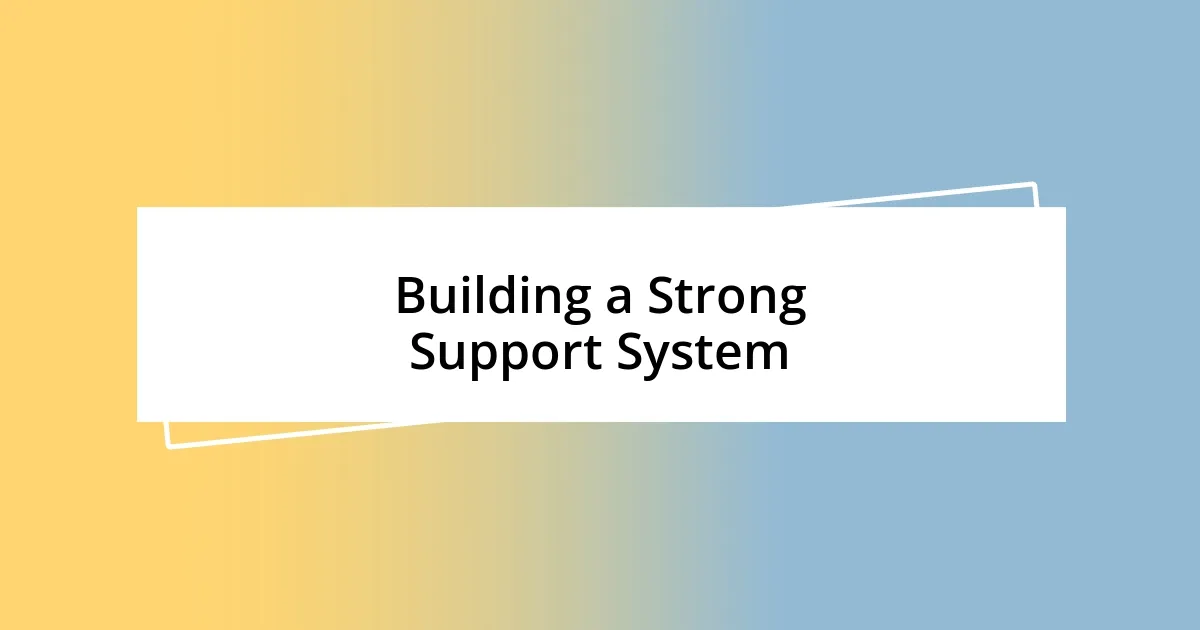
Building a Strong Support System
Building a strong support system involves surrounding yourself with people who genuinely uplift and encourage you. I recall a time when I felt overwhelmed by the weight of wedding planning. My friends noticed my stress and organized an impromptu get-together to help me unwind. They reminded me that it’s crucial to lean on those who bring positive energy into your life. Have you ever found solace in unexpected support?
I’ve also learned that it’s essential to communicate openly with family. Early on, my partner and I decided to include our parents in certain planning decisions. Initially, I was nervous about their opinions, fearing they might overstep. However, when I invited them to share their thoughts, it turned into a delightful bonding experience. It taught me that engagement isn’t just about the couple; it’s about uniting families and making them feel valued, too.
Lastly, I think it’s vital to prioritize friendships that foster growth. One of my closest friends always encourages me to step outside my comfort zone. When she suggested a group creative project to plan for our wedding, I hesitated at first. But diving into that project with her and others not only lightened my load but also strengthened our connections. I wonder, have you experienced a project that unexpectedly brought you closer to your friends? Such moments transform struggles into shared experiences, weaving a strong network of support that carries you through.












